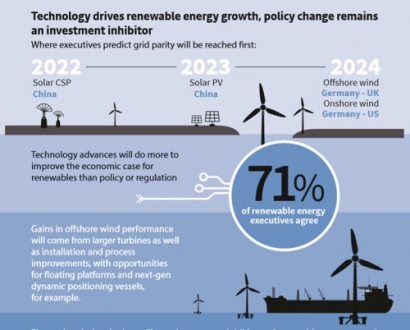
The study asks the question: when will renewable energy become the dominant source of energy? Furthermore, the study examines which technologies are likely to have the greatest impact in different countries, and what are the key drivers and inhibitors for success.
The research sought the insights and opinions of leaders across the sector, as well as a survey of 800 professionals and experts around the world. It included respondents from organizations across the renewables value chain, including traditional energy companies with renewable energy assets or activities.
Respondents were asked to give their perspective on the challenges that need to be overcome for renewables to become the primary form of energy consumed, the rate of growth in their country and to rate a number of technologies and developments in terms of their potential impact, the amount of time it would take for these technologies to hit the market, and how likely they are to be adopted once they do. Respondents were also asked to reflect on the pace and success of innovation in their sector - and what they see as the major drivers and blockers post 2018.
Key findings include:
“Our latest Technology Radar - Renewable Energy research reflects the most current and forward-looking attitudes, actions, and investment behaviors in both global and local renewable energy markets. These trends are striving to shape tomorrow’s sustainable energy mix and are framing a clear end in sight for a big transformational shift in sustainable energy provision,” said Alasdair Buchanan, Director of Lloyd’s Register’s Energy business.
This is the fourth year Lloyd’s Register has conducted its award-winning Technology Radar research. Earlier editions focused on the oil and gas sector and low carbon, but this time around, the research concentrates on the renewable energy sector, with particular attention to sustainable energy drivers, geo-and political demographics, energy demand, market design, policy, technology, public appetite and social licence.
The research delivers insights that Lloyd's says will help to inform industry debate and energy policy across the world, and may help to raise further discussions on areas such as standardization and putting a price on carbon that treats all carbon equally which is an increasing focus for industry. For oil and gas producers a standardized carbon price scheme for emissions provides a financial incentive to seek solutions through efficiency and innovation in lower carbon technologies.
The 2018 Technology Radar Renewable Energy report is published today, February 13, 2018.Go to lr.org/techradar to download the 2018 Technology Radar Renewable Energy report and findings, plus the Executive Summary in English, Chinese, French, German, Portuguese or Norwegian

